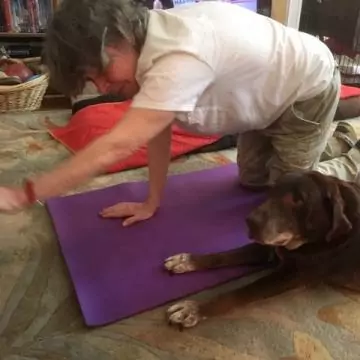It's just a matter of time before they name a syndrome after me.

Sue retired in 2019 at 67. Since then, Sue has been clawing her way through months of vestibular rehab therapy. A determined and heroic Sue is pictured here with her canine therapist, “Uncle Brenda.”
It all began when Sue and I met friends at a restaurant in August 2017. Sue was not interested in dinner that evening. We had visited Urgent Care a week before and her primary doctor that day and were given a big bottle of GERD medicine. When we returned home after dinner, Sue had a heart attack as we walked up the hill in our front yard. While Sue protested my 911 call, she sat down at the dining room table and complained that her throat was on fire.
Sue was quickly whisked off to the ER and 3 days later into heart surgery, where she had a successful double bypass and 2 other blockages were removed. Twelve weeks later Sue eagerly went back to her job. Within 6 months, Sue unknowingly headed into decompensation – a speech slur, handwriting and balance issues. Sue describes it as “The Crash.”
The cardiologist kept telling Sue to drink water for the dizziness. Sue took this advice very seriously, and ended up in the emergency room over-hydrated. Several neurologists suggested that she had Parkinson, Ataxia or ALS.
Sue endured a long list of inconclusive scans. MRI, DAT, EMG and ENT tests left her with 2 weeks of intense tinnitus and a bad attitude noted on her report (hence the nickname, “Surly Sue”). However, Sue was fortunate to find a dedicated balance therapist and a realistic anxiety therapist to help her. Due to drug sensitivity, Sue is unable to take meds for her anxiety since most of them list “dizziness” as their first side effect. Sue is working on her mindfulness, which she calls the “Foreverness of Now.”
Fast-forward to 2020, Sue is bravely wrestling with the same stubborn symptoms of severe imbalance, inflammation and nerve damage. Her “Brain Bullies” include dizzy, sway, spin, swirl, swim, heavy head and light head fog accompanied by coordination issues with speech, hands and legs – full of pinched nerves, irritated proprioceptors, and a bit of head turning PPPD. Every day feels worse.
Sue walks 1.5 miles daily holding onto my arm while our dogs scamper in the hills of a deserted golf course. Thoroughly over-stimulated, Sue retreats to her “bunker” (the bed) while I cook a big breakfast for all of her hard work. Then, onto the treadmill of Time and Repetition with daily rehab exercises, therapy and support groups like VeDA.
Thank you, VeDA for your outreach, your forums, your specialist contacts and your courageous members, who are on similar journeys through this maze of invisible vestibular madness and dizziness. Any help, advice or recommendations are welcome – email [email protected]
Written by her wife of 30 years, Lissa Flock
Edited by Sue 5/3/2020